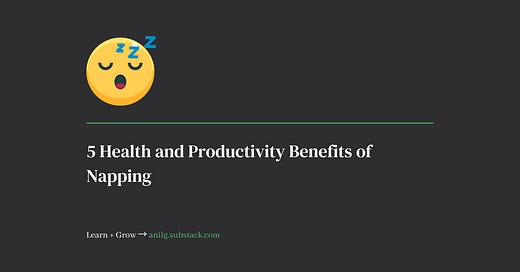5 Health and Productivity Benefits of Napping 😴
Issue #8 : Napping is one of my top hacks for better productivity and health.
Napping, for me, is like a charging station to recharge my brain and body during the day.
Dozens of research studies on naps have concluded that naps provide health, longevity, and productivity benefits.
These famous people in history were the big proponents of naps:
Winston Churchill
Albert Einstein
Leonardo Da Vinci
Thomas Edison
Aristotle
Here are 5 benefits of naps:
#1 Improved Productivity and Performance
Usually, around noon our brain starts feeling tired, starts losing focus, and we can hardly get anything done.
Taking a quick nap recharges our brains, and we feel refreshed and renewed.
Napping gives me an extra energy boost and makes me more productive for the rest of the day.
I get 50% more productive time pairing my nap with an early morning start of the day. Here’s what my day typically looks like with an afternoon nap:
5:30 am to 1:30 pm (8 hours) [2 hours personal growth, 6 hours work]
2:00 pm to 10:00 pm (8 hours) [3 hours work, 2 hours personal growth, 3 hours chill time]
💡 One study concluded that we get 34% better in anything after a nap—learning, work, creativity, problem-solving, etc.
#2 Improved Memory
When a memory is first recorded, it’s stored in the hippocampus — the area of the brain where memory is still “fragile” and easily forgotten. Napping pushes the memories to the part of the brain called the neocortex, which is the long-term storage area of the brain.
In one study, participants were asked to memorize illustrated cards to test their memory. The group who took a nap could remember 85% of the patterns and the group who didn’t nap remembered only 60%.
Your cognitive energy is at its peak for the two hours after your nap.
#3 Improved Health and Longevity
Sleep is good for your heart.
A study discovered that people who took naps had a decreased risk of death from heart disease.
Taking one nap a week can improve your heart health, resulting in 42% less heart disease, stroke, and heart attack.
Researchers in a separate study found that participants who took 30-minute naps 3x a week had a 37% lower coronary death rate than those who did not.
#4 Improved Learning Ability
Napping keeps your brain sharp. A sharp brain improves focus, memory, and alertness, which are essential for learning.
A study done at the University of California concluded that the learning performance was the same for those who had 8 hours of sleep and those who had 4 hours of sleep plus a 60-minute nap.
💡 4 hours of sleep + 1 hour nap = 8 hours of sleep
#5 Boosts Mood
Napping makes you happier. The amygdala, (threat sensor in our brain), is 60% more active when you don’t get a good night's sleep, but a 1-hour nap will reset the amygdala the next day.




